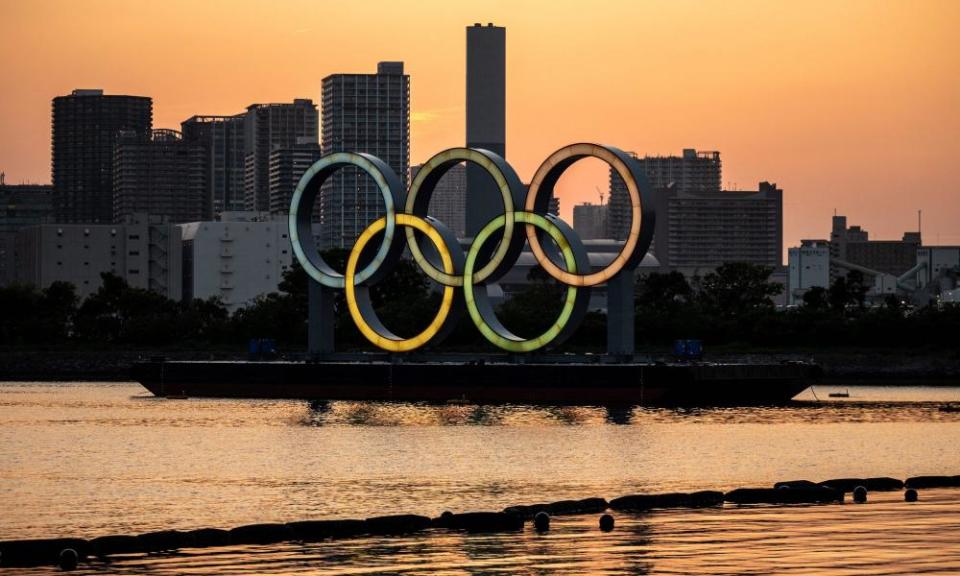National cabinet to consider whether Australian Olympic delegation can jump vaccination queue

State and territory leaders will debate on Thursday whether to allow Australia’s Olympic athletes to jump the queue for Covid-19 vaccines and to skip mandatory quarantine, as the government faces calls for a major reset of the troubled rollout.
The Australian Olympic Committee has been pushing the federal government to fast-track vaccines for Australia’s 1,400-strong delegation to the Tokyo Olympics and to consider allowing athletes an exemption from the mandatory two-week quarantine requirement when they return home.
But the consideration of special treatment for Australia’s athletes comes as the government comes under fire for its slow rollout of vaccines to vulnerable groups, and as the Australian Medical Association calls for Thursday’s meeting of national cabinet to urgently reset the program.
Related: Citius, altius, virus: it seems absurd, but the Olympic Games must go on | Barney Ronay
The focus of Thursday’s national cabinet is a redesign of the rollout strategy to bring forward vaccinations for more over-50s and to develop plans for state-run vaccination hubs once supplies increase later in the year.
The government has been forced into a “recalibration” of the vaccine program following health advice of a low risk of rare blood clots linked to the AstraZeneca vaccine for people under 50, leading to the Pfizer vaccine being recommended for that cohort.
But amid concern about the pace of the rollout, particularly for vulnerable groups, the Australian Olympic Committee is pushing for athletes to be given vaccines before the July Tokyo Olympics, which is expected to go ahead despite Japan facing a fourth wave of the Covid pandemic.
An AOC spokesperson said that while the committee had been clear it wanted vulnerable and elderly Australians vaccinated before athletes, the window for athletes and travelling officials was rapidly closing and it wanted national cabinet to make a decision.
“The government has been reassuring us that it hears us,” an AOC spokesperson said.
Sport minister Richard Colbeck said the government was still considering the AOC’s request, with the matter on the agenda for Thursday’s national cabinet meeting.
“We are considering this request in the context of the implementation of the program in Australia – the current phased approach Australia is taking to protect those most vulnerable of contracting Covid-19 or being at serious risk of adverse outcomes from Covid-19 and the potential for exposure of the Olympic team to Covid-19 while at the Olympic Games,” Colbeck told Guardian Australia.
The AOC also wants the mandatory 14-day quarantine period waived for returning athletes, with the government expressing concern that the 1,400-strong Olympic contingent could slow down the pace of other Australians wanting to return home.
“We want to see our athletes head to Tokyo to compete on the world stage and then return to Australia safely,” Colbeck said.
“The Australian Olympic Committee is working on proposals to ensure safe passage to and from the event and is also in discussions with the states and territories to determine how to best quarantine the Olympic squad, ensuring other Australian travellers do not get squeezed out of the quarantine queue.”
The AOC said it was concerned about the mental health of athletes returning to quarantine in Australia after competing in another “bubble” in Tokyo where movement would be restricted.
Labor’s health spokesperson Mark Butler said that the opposition supported Australia’s Olympic team being vaccinated, but they had seen no detail from the health minister, Greg Hunt, about how this would be managed.
“I think all Australians will want to see the Australian Olympic team compete in Tokyo if possible, and if that means being able to make sure that they and their staff are vaccinated I’m sure Australians would support that,” he said.
Labor MP Josh Burns said the government needed to first outline “a clear plan to vaccinate our most vulnerable Australians” before turning to athletes.
On Tuesday, health officials revealed that fewer than 7% of disability care residents had so far received a dose of Covid vaccine, leaving 25,000 unvaccinated despite being in the top priority group.
The Australian Medical Association said national cabinet needed to make “clear changes” to reset the vaccination program, including improvements to distribution of vaccines, increased supplies, and better communication about the vaccine benefits.
It also wants changes to the Medicare benefit schedule to compensate doctors for longer appointment times associated with patients wanting more information about vaccine risk.
AMA president Omar Khorshid, said the association supported bringing forward the vaccine timetable for the over 50s, but GPs needed certainty of supply.
“We are seeing vacant appointment times and we need to ensure that these are filled each and every day,” Khorshid said.
“We know the government has faced supply constraints, but it is important that the reset sees more of the available supply of vaccine going to general practice so that GPs can deal with the increased demand that will come from those aged 50 and over.”
Ahead of Thursday’s meeting of state leaders, Victoria announced plans to build a $50m mRNA vaccine facility to try to improve Australia’s sovereign vaccine manufacturing capabilities.
Prime minister Scott Morrison said the move was a “great” initiative and that the federal government was also interested in supporting the technology.
“That is a competency and a capability that I want Australia to have,” Morrison said.

 Yahoo Finance
Yahoo Finance 